Читать книгу Competitive Advantage in Investing - Steven Abrahams - Страница 13
1 Welcome, Harry Markowitz In the Beginning
ОглавлениеImagine a simple beginning. You have some spare cash. You have covered your daily cost of living and other bills, and it's rattling around in your pocket. You start thinking about what you might do with it. Other than spend it, that is. That is the beginning. With that thought, you have become an investor.
Or imagine that you are sitting at a bank or insurance company or mutual fund. Or a hedge fund or some other place that invests professionally. In front of you is a number with the cash you have to invest. You have work to do.
You start penciling out a list. It's short at first. Maybe you think about putting the money in a drawer just because it's convenient. Perhaps you think about putting the money in a bank. Or you think about making a loan to someone or some company somewhere in the world. You think about investing as an owner of a business or several businesses. You imagine a budding international empire of businesses. The list has only started.
You could buy a bond from a government or from a company somewhere in the world. You could buy stock. You could buy an option, where someone takes a payment today and agrees to either buy or sell something at a certain price in the future. You could buy insurance or a contract that works like insurance, where someone takes a payment today and agrees to cover losses or damage in the future. You could buy gold or silver, wheat or orange juice, oil or other commodities. You could buy an apartment or an apartment building, an office building, or other commercial property. That's a lot to consider, but the list goes on.
You could buy shares in funds managed by professional investors—even if you are a professional investor yourself. The fund would invest on your behalf in any or all of the available markets. You could buy shares in funds that make loans, buy and sell private companies, buy and sell bonds or equity, own options or commodities or real estate, or any combination of these and other things. You could own funds that trade their investments all the time or almost never. The list continues.
It you printed this list out and watched the pages tick off of the printer and slide onto the floor, it would likely run longer than the longest list you have ever seen. It would fill up the room, spill into the hallway, out the front door, and down the street. It would keep going from there. You could follow it to the ocean and watch it start to fill up the deepest parts. The list would literally be endless.
Now that you have this infinite list, choose. Build your portfolio.
